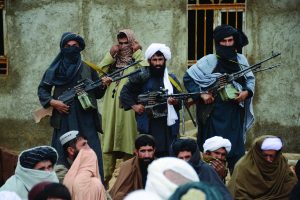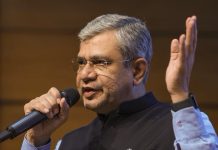 Who is afraid of Uncle Sam? The Pakistanis have dared the US establishment, and now, they are busy in having strategic alliances with Russia and China. Pakistan under its military-sponsored Prime Minister Imran Khan has succeeded in garnering adequate funds for its survival for next year. Both Saudi and Chinese governments have extended huge financial assistance to Pakistan, which could enable its financial difficulties for next 12 months.
Who is afraid of Uncle Sam? The Pakistanis have dared the US establishment, and now, they are busy in having strategic alliances with Russia and China. Pakistan under its military-sponsored Prime Minister Imran Khan has succeeded in garnering adequate funds for its survival for next year. Both Saudi and Chinese governments have extended huge financial assistance to Pakistan, which could enable its financial difficulties for next 12 months.
Emboldened with these liberal funding, Pakistani army and its intelligence wing, Inter-Services intelligence (ISI), have decided to challenge India by adopting the twin strategy of projecting itself a victim of terrorism while quietly fanning up terror activities in Jammu and Kashmir as well as in the bordering states of Punjab and Rajasthan. The Imran Khan government appears to have green signaled to the renewed terrorists’ attacks on India, especially following the presence of two former Indian diplomats, Amar Sinha and TCA Raghvan at the recently held Moscow meet for peace in Afghanistan.
India did not send any official delegation to the conference, but it deployed two non-officials, who earlier had served as India’s Ambassador to Kabul and the High Commissioner to Pakistan. An angry Pakistani establishment has triggered off ISI-sponsored activities from Canada to Dacca. Meanwhile, Bangladesh has refused to Pakistani envoy Saqlain Syedah for her close ties with ISI amidst the reports that its Dacca high commission is perpetrating ISI activities in Bangladesh and the neighboring West Bengal and the north-eastern states of India.
The Pakistan’s growing frustration against India can be guessed by the recent statement of its foreign secretary, Tehmina Janjua, before the Senate Committee on Foreign Affairs accusing India of using Afghan soil for militancy in Pakistan and asserted her country would soon took up the matter with the US. She asserted that the “US has been apprised of the fact that Indian intelligence agency RAW is using Afghan soil for terrorist activities in Pakistan.” During the debate in the Pakistani senate, it was reasserted that “Pakistan only receives “a trickle” of economic assistance from the US and does not get any military hardware from them and Pakistanis are not like in the past when they were American’s proxy,”
According to a USAID report, the US aid to Pakistan till 2012 stood at $60 Billion. Also, in the last five years alone, since 2011, Pakistan has received some $15 Billion in aid from America, including military and financial assistance.
After US President Donald Trump called Pakistan a treacherous nation and a safe haven for terrorists, engaged in double-dealings, harboring and protecting the very same terrorists who attack the US interests in Afghanistan, while unveiling his South Asia policy, the US has increasingly been putting more pressure on Pakistan to honor its commitment.
Pakistan has praised itself for the brilliant rescue operation to liberate a US-Canadian family who was in Haqqanis’ captivity for five years, the terse response from Trump was, “the Pakistani government’s cooperation is a sign that it is honoring America’s wishes for it to do more to provide security in the region.”
The US has taken measures including cutting military aid to Pakistan and is going to curtail its role in Afghanistan while at the same time is looking for a strategic partnership with India in Afghanistan’s reconstruction process, a cornerstone of Trump’s new Afghanistan policy, even if Pakistan sees an increased Indian presence in Afghanistan inimical to its interests.
Balochistan unrest
During the discussion, the chairman of Senate panel, Rehman Malik, targeted Prime Minister Narendra Modi for the growing unrest in Balochistan. According to him, the Research and Analysis Wing (RAW) and Afghan intelligence agency were carrying out “terrorist activities” in Balochistan. He was extensively quoted in the daly newspaper, Dawn. The anti-India drama was further enacted before the Senate sub-committee, when the Frontier Corps of Balochistan, a part of the federal paramilitary forces of Pakistan, alleged that “enemies” of the country have plans to increase the level of violence in the province.
The Inspector General of the Balochistan Frontier Corps, Major General Nadeem Anjum, claimed before the senate panel that the move by the “enemies” was aimed at compelling United Nations intervention to declare Balochistan an independent state. These statements enabled Anjum to seek more funds for the para-military troops.
While comparing the situation in Balochistan with that in countries like Libya and Yemen, he alleged that efforts were being made to create unrest across Balochistan, pointing that earlier there was disturbance in just parts of the province. He demanded that his troops should be equipped with “modern gadgets and helicopter”.
The Congressional Research Papers extensively quoted in media point out that during the past nearly two decades, since 2001, Afghanistan has been a central U.S. foreign policy concern. In response to the terrorist attacks of September 11 on its towers in New York, the US-led military campaign against Al-Qaeda and the Taliban government that harbored and supported Al-Qaeda in Afghanistan enabled it to destroy the terrorists initially, but it has resurfaced in recent years.
The United States has suffered more than 2,000 casualties in Afghanistan and has spent more than $132 billion for reconstruction in the strife-torn coutnry. In that time, an elected Afghan government has replaced the Taliban, and nearly every measure of human development has improved, although future prospects of those measures remain mixed. While military officials profess greater optimism about the course of the war in 2018, other policymakers and analysts have described the war against the insurgency (which controls or contests nearly half of the country’s territory, by Pentagon estimates) as a stalemate.
The Parliamentary elections were held in October 2018 but were marred by technical, logistical, and security problems; the upcoming presidential election scheduled for April 2019 could further inflame political tensions. Meanwhile, a series of developments in 2018 may signal greater US urgency to begin peace talks to bring about a negotiated political settlement, the stated goal of US policy.
These documents claim that the United States has encouraged Afghanistan’s neighbors to support a stable and economically viable Afghanistan. The neighbor considered most crucial to Afghanistan’s security is Pakistan. President Trump has directly accused Pakistan of “housing the very terrorists that we are fighting.
“The Afghan leaders, along with U.S. military commanders, attribute much of the insurgency’s power and longevity either directly or indirectly to Pakistan; President Ghani said in February 2018 that Pakistan was “the center of the Taliban.” Experts debate the extent to which Pakistan is committed to Afghan stability or is attempting to exert control in Afghanistan through ties to insurgent groups, most notably the Haqqani Network, which is an official, semiautonomous component of the Taliban.
Amidst the in-depth information that the U.S. officials have repeatedly identified militant safe havens in Pakistan as a threat to security in Afghanistan, though some question the validity of that charge in light of the Taliban’s increased territorial control within Afghanistan itself. Pakistan sees Afghanistan as potentially providing strategic depth against India.
Pakistan may also view a weak and destabilized Afghanistan as preferable to a strong, unified Afghan state (particularly one led by a Pashtun-dominated government in Kabul). However, at least some Pakistani leaders have stated that instability in Afghanistan could rebound to Pakistan’s detriment; Pakistan has struggled with indigenous Islamist militants of its own. Another aspect of the ongoing discussion is that Pakistan may anticipate that improved relations with Afghanistan’s leadership could limit India’s influence in Afghanistan.
Revised Regional Approach In his August 2017 speech, President Trump identified a new approach to Pakistan, saying, “We can no longer be silent about Pakistan’s safe havens for terrorist organizations, the Taliban, and other groups that pose a threat to the region and beyond.” In the same speech, President Trump praised Pakistan as a “valued partner,” citing the close US-Pakistani military relationship. However, the Trump Administration announced in January 2018 plans to suspend security assistance to Pakistan in a decision that could impact hundreds of millions of dollars in aid.
Myopic US approach:
An over-confident US allowed Saudi Arabia and Pakistan to manage Afghanistan jointly. It favored military dictator General Zia ul-Haq, who had proved to be a key U.S. ally during the Cold War. But as the Soviets were preparing to withdraw from Afghanistan, Haq died in a plane crash in 1988.
During the post Zia years, Secretary of State George Shultz, Under Secretary of State for Political Affairs Michael Armacost, Assistant Secretary of Defense for International Security Richard Armitage, devised a US strategy for Pakistan that consisted of deepening ties with Pakistan’s military establishment and intelligence agencies while also supporting democratic developments such as general elections. Soon after the Soviet withdrawal, Afghanistan devolved into a civil war that ended when the Taliban took over and established the “Islamic Emirate of Afghanistan.”
Former US President Clinton visited India, Pakistan, and Bangladesh — the first US president to visit South Asia since the end of the Cold War. Clinton’s historic visit set the tone for an improved U.S.-India relationship. However, the administration was inflexible toward Pakistan. Clinton publicly lauded the country for striving to be a “beacon of democracy in the Muslim world.”
President Trump is trying to correct the mistakes of his predecessors. In this process, he is facing ridicule as well as stiff opposition. Few are surprised, when Trump is criticised and even ridiculed in Pakistan. Most of the Pakistani leaders are confident that once Modi is replaced by a docile Indian leader, they may continue their old game of triggering off the non-state players against India. Pakistan will never tolerate Indian presence in Afghanistan. The Amritsar blast is just a beginning.
letters@tehelka.com












